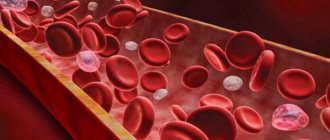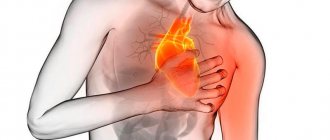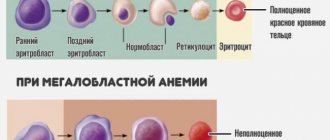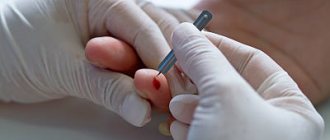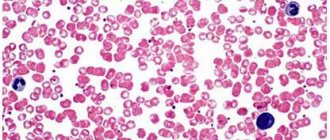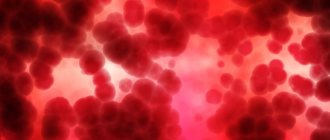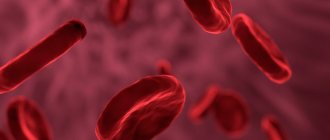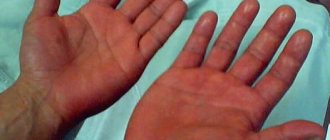Everyone knows that blood is a liquid substance that fills the vessels of our bodies. But sometimes you can hear such a seemingly strange phrase as “thick blood.” What does it mean? Some time ago, in the countries of the post-Soviet space, it was very fashionable to “treat” blood thickening with the help of leeches. At the same time, such patients often did not understand what thick blood actually is, whether such a condition is dangerous and how to treat it correctly. Many misconceptions regarding this issue are widespread in our time.
What is “thick blood”
What is commonly called thick blood in simple terms is known to specialists as hyperviscosity syndrome or hypercoagulation syndrome. Such a condition in medicine is considered as a deviation from the norm, which can be contributed by various factors. But in order to fully understand what hypercoagulability syndrome is, you need to have an idea of the composition of the blood.
So, blood consists of the following components:
- cellular part (erythrocytes, platelets, leukocytes);
- non-cellular part (plasma, which is also a liquid component);
- ions of macro- and microelements, hormones, enzymes and other substances that are carried throughout the body by blood.
Content:
- What is “thick blood”
- Causes of “thick blood”
- What promotes thickening
- Who's at risk
- Why is condensation dangerous?
- How is the “thickness” of blood determined?
- External signs of thickening
- How to treat
- Blood thinners
Each of these components is vital for humans. But it is equally important that all components of the blood maintain a certain balance. And such a characteristic as blood viscosity is nothing more than the ratio between plasma and cell mass. If this balance is disturbed, the blood either becomes too thin or thickens. For example, when the body experiences a lack of erythrocytes (red blood cells), they speak of anemia (previously the term “anemia” was used), because the blood becomes unnaturally thin. The opposite effect occurs when there are too many red blood cells. But this is not the only reason for blood thickening.
Nutrition correction
To prevent the formation of blood clots and blood thinning, healthy eating experts advise eating large amounts of fresh fruits, berries and vegetables daily (they are rich in vitamins, minerals and bioflavonoids). The menu must include fatty fish 2-3 times a week; for dressing vegetable salads, use unrefined vegetable oils (a source of vitamin E and unsaturated fatty acids).
The main natural anticoagulant is drinking water.
Drinking 1.5-2 liters of water daily will reduce blood viscosity and reduce the likelihood of blood vessels clogging with blood clots. If you are prone to blood clots, 10 products are considered the best for thinning your blood.
They are available to everyone, their use will help to significantly reduce blood viscosity and prevent the formation of clots in the arteries. What foods should you not eat if you have thick blood?
Advertising:
- spinach;
- white cabbage;
- beans;
- green pea;
- broccoli;
- arugula;
- parsley
Vitamin K plays an important role in the body in treating wounds and abrasions, as it stimulates the blood clotting process. But with its pathological thickening, excessive consumption of foods rich in this vitamin can be dangerous due to the formation of clots and arterial thrombosis.
Causes of “thick blood”
Speaking in the language of specialists, blood thickening leads to a deterioration in its rheological properties. That is, blood flows slower and more difficult. It can become thicker for various reasons. As a rule, this condition is accompanied by:
- violation of hematocrit;
- increased hemoglobin;
- an increase in the number of red blood cells;
- decreased elasticity of red blood cells and their deformation;
- aggregation (sticking together) of red blood cells;
- acceleration of blood clotting (due to an increase in the amount of fibrinogen);
- an increase in the amount of paraproteins (specific proteins that appear in the plasma during myeloma).
Common causes of blood thickening:
- Coagulopathies. This is a group of diseases in which blood clotting occurs. These include autoimmune, genetic and coagulopathies of toxic origin.
- Liver diseases. The liver is involved in the production of proteins responsible for blood clotting. And some diseases can increase or decrease the synthesis of these substances, which affects blood viscosity.
- Oncological diseases. Malignant blood diseases cause an imbalance between the plasma and cellular components of the blood.
- Dehydration. There can be many reasons leading to dehydration. The most common one is not drinking enough water. Diarrhea, severe and prolonged vomiting, taking diuretics, and poor absorption of water by the body also lead to dehydration. But regardless of the reason, the result is always the same - the substance in the vessels becomes thicker.
Which doctor should I contact?
Some medications can cause blood to thicken.
If you experience frequent dizziness, aching headaches, dry skin and other signs of blood thickening, you need to contact a therapist, who will prescribe the necessary tests that reflect the state of its composition - a coagulogram and a general detailed blood test. To find out the reasons for such deviations, consultations with other specialists may be necessary: an endocrinologist, hepatologist, etc. After identifying the causes of blood thickening, appropriate treatment for the underlying disease is prescribed or the cause of changes in its parameters is eliminated.
Blood is the main source of nutrients for our body. It introduces them into tissues and removes from there harmful components that accumulate after the completion of physiological processes. A variety of external and internal factors can change its composition and influence the rheological properties, the effects of which should be stopped.
To determine blood density indicators, you should regularly take a general blood test. The frequency of such monitoring studies performed for preventive purposes is determined by age and the presence of concomitant diseases.
What promotes thickening
High blood viscosity syndrome can manifest itself as an inherited genetic disease. As a rule, such people have a tendency to more active thrombus formation. More often, hypercoagulation syndrome is secondary in nature, that is, it develops under the influence of external or internal factors.
Risk factors:
- Aging. As most people age, the blood vessels become stiffer and more calcified, which impairs the flow of blood through them. Upon reaching the age of 50, it is recommended to monitor blood rheology, and for this purpose, medications are prescribed to maintain its fluidity.
- Overweight. Obesity is accompanied by metabolic disorders in the body, due to which the blood can become more viscous, and atherosclerotic changes are observed in the vessels.
- High cholesterol. Lipoproteins always increase the proportion of the thick component.
- Smoking. Cigarette smoke contains substances that increase the risk of blood clots and affect the density of the substance in the blood vessels.
- Alcohol abuse. Alcoholic drinks contribute to rapid and severe dehydration of the body. Scientists have calculated that the ratio of alcohol consumed and the liquid it removed from the body is 1:4. Therefore, if the hydrobalance is not restored in time, the share of the liquid part in the vessels decreases.
- Bed rest for a long time. Post-surgery, as well as some health problems, may force a person to remain in bed. Over time, inactivity leads to impaired blood flow and stagnation of blood, which ultimately causes blood to thicken.
- Severe hypothermia or burns. Extreme temperature effects lead to severe stress, dehydration, and impaired hematopoietic function, which also increases the risk of hypercoagulation syndrome.
- Organ transplantation, surgery on blood vessels or their injury, installation of implants (valves, dialysis shunts, venous catheters, etc.). Any impact on the heart or vessel walls leads to the formation of irregularities, and this increases the risk of increased blood clot formation.
- Inflammation. Any inflammatory process, especially if it is chronic, provokes an increase in the number of leukocytes, fibrinogen, proteins and cholesterol. When there are too many of these components, the blood becomes viscous.
- Physical inactivity. Experts use this term to describe a sedentary lifestyle. The causes of thickening in sedentary people are associated primarily with impaired blood flow in the vessels.
- Taking hormonal contraceptives. Hormone-based drugs often lead to increased thrombus formation, which changes the density of the substance in the vessels.
- Pregnancy. As the fetus matures, the uterus increases in size and puts pressure on the pelvic vessels. This leads to blood stagnation and excessive blood clot formation.
- Toxin poisoning. Poor environmental conditions, eating food contaminated with heavy metals, and radiation can also contribute to hyperviscose syndrome.
- Microorganisms. Most diseases caused by viruses, bacteria, fungi and some parasites are accompanied by fever and the accumulation of toxic substances in the body. And this is another factor that causes thickening of fluid in the veins. In this case, the degree of thickening depends on the nature and intensity of exposure to the toxin or parasite.
- Stress. During stress, the body releases hormones that cause vasoconstriction, causing blood circulation to slow down. If the stressful condition is chronic, the blood tends to thicken.
Troubleshooting methods
If there is a threat of blood clots forming in the vessels, doctors prescribe antiplatelet drugs, that is, drugs that reduce blood clotting. These medications do not thin the blood; their action is aimed at inhibiting clotting mechanisms. They eliminate the risk of blood clots. Antiplatelet drugs do not affect the hematocrit; it remains the same as before the use of these drugs.
To reduce blood clotting, some doctors recommend drinking sweet clover, willow bark, and horse chestnut infusions. In resolving this issue, Alexander Shishonin gives preference to medications. In this case, you can use Cardioaspirin. He also notes that in order to prescribe good anticoagulant therapy, the patient needs to undergo a detailed blood clotting test. Only in this case can you choose effective, high-quality drugs.
Note.
With long-term use of acetylsalicylic acid, quite serious complications can occur. Medicines affect the chemical and morphological composition of the blood through the bone marrow, since it is a producer of cellular elements.
According to Alexander Yurievich Shishonin, the most effective means of thinning the blood is movement. Every day you need to walk at least 5 km. You can learn how to do this correctly by becoming a member of the “ Club of Former Hypertensive Patients.”
" Registration of participants is completely free. Healthy walking can replace a hundred medications, but not a single medicine can ever replace movement.
Who's at risk
Any of the above factors can cause blood thickening. But also people suffering from the following diseases are at increased risk:
- hepatitis;
- cirrhosis of the liver;
- pancreatitis;
- food poisoning;
- varicose veins;
- hypoxia;
- myocardial infarction;
- thrombophilia;
- atrial fibrillation;
- heart failure;
- stroke;
- diabetes;
- antiphospholipid antibody syndrome;
- amyloid dystrophy;
- leukemia;
- myeloma;
- bone marrow cancer;
- polycythemia;
- adrenal dysfunction.
The development of hypercoagulability syndrome is facilitated by long-term use of diuretics, non-steroidal anti-inflammatory drugs, as well as drugs containing estrogen or phytoestrogen.
Why is condensation dangerous?
Blood viscosity often increases in pregnant women. In this case, this process plays a natural role of protection against possible bleeding and miscarriage. Also, the fluid in the vessels of women becomes thicker immediately before childbirth. This is how nature protects the expectant mother from severe blood loss. But excessive thickening during pregnancy can be dangerous both for the woman (promotes thrombosis, thrombophilia, varicose veins, leukemia) and for the fetus (damage to the vascular bed).
As for newborns, their blood is much thicker than that of adults. But that shouldn't be a concern. The baby needs time to adjust to life in a new environment. In the first hours after birth, hemoglobin in the baby’s body can reach 200 g/l. But already in the first few days of life, these numbers will begin to decline. Almost half of the hemoglobin will be destroyed in the first day and the thickness of the baby’s blood will decrease.
It’s a different matter for adults whose blood has become thick for various reasons. They should not expect the indicators to return to normal on their own. This condition can be dangerous to health.
Often, thickening is accompanied by increased formation of blood clots, which can clog blood vessels, preventing normal blood flow. If a blood clot blocks a vessel in the heart or brain, a heart attack or stroke may occur, possibly with death.
If the substance has become viscous, but the number of platelets has decreased, this condition leads to circulatory problems in the body and increases the risk of bleeding. In some cases, hypercoagulability syndrome accompanied by a reduced platelet count is a symptom of cancer.
If increased viscosity is not treated, this condition can provoke hyperosmolar coma and intracerebral hemorrhage, which has a high risk of death.
How is the “thickness” of blood determined?
To measure thickening, specialists use a device called a viscometer. It measures the speed of movement of the substance in the vessels, and then compares this indicator with the speed of movement of distilled water. For measurements, blood and water are taken in equal quantities at identical temperatures.
It is considered normal if blood flows 4-5 times slower than water, and its relative density (depending on the number of red blood cells) remains within the range of 1.050-1.064 g/cm3. This value determines the amount of salts, proteins and formed elements in the plasma.
Hematocrit (the volume of red blood cells in 1 liter of blood) differs depending on gender and age. For women, the norm is 37-47%, for men - 40-54%, for newborns - approximately 20% more than for adults, and 10% more than for older children.
As for laboratory viscosity indicators directly, the norm is considered to be from 4 to 5.5. This parameter directly depends on the number of red blood cells in the plasma: the more there are, the stronger the viscosity.
In addition to the viscometer, immunoelectrophoresis (determines what proteins are in the plasma) and immunochemical study (counts the number of proteins) are also used to diagnose blood thickening.
Fibrinogen norm
The fibrinogen standard taken as a basis was discovered through clinical studies of various groups of people.
Table 1. Fibrinogen levels in different groups of patients
| Patient group | Fibrinogen norm, g/l |
| Adult men and women | 2—4 |
| Pregnant women (highest value for 3rd trimester) | 6—7 |
| Newborn babies | 1,25—3 |
Regulation of fibrinogen concentration in the blood depends on many different factors. Protein levels are affected by gender, age, general condition of the body and human activity.
The average fibrinogen value for the population as a whole is considered to be the norm: researchers diagnosed healthy patients from each specified category, and then determined the average fibrinogen value for a healthy person.
External signs of thickening
The most accurate indicators of this condition can be determined exclusively by laboratory analysis. However, there are a huge number of signs that may indirectly indicate that the fluid in the vessels flows more slowly.
People with high blood viscosity may experience the following symptoms:
- aching headaches;
- fainting state;
- dizziness with loss of coordination;
- fast fatiguability;
- drowsiness;
- in places of cuts, blood flows unnaturally slowly;
- muscle weakness;
- heaviness and pain in the legs;
- "pins and needles" sensation, numbness, burning, tingling in the legs and arms (paresthesia);
- noise in ears;
- increased sensitivity to low temperatures;
- dry skin;
- cyanosis (cyanosis) of certain areas of the skin, mucous membranes of the mouth and eyelids;
- increased anxiety;
- sleep disorders;
- tendency to depression;
- constipation
Often hyperviscose syndrome occurs in parallel with chronic fatigue, candidiasis or irritable bowel syndrome.
Description of the drug Tiklpid
Taking Triclid can reduce the aggregation of blood platelets and significantly reduce the viscosity of biological fluid. Violation of the prescribed treatment regimen and overdose can lead to the following adverse reactions:
- bleeding;
- lack of platelets necessary for natural blockage of damaged areas of arteries, vessels and tissues;
- decreased levels of white blood cells;
- abdominal pain;
- diarrhea.
In case of severe blood thickening, the drug is prescribed for a long course, and the patient’s condition is regularly monitored. When the rheology of the main biological fluid is restored, the drug can be discontinued. However, stopping the medication does not replace regular blood quality testing.
